《英语周报》英语四级考试听力模拟试题(十一)
大学英语四级考试模拟试题(附答案)
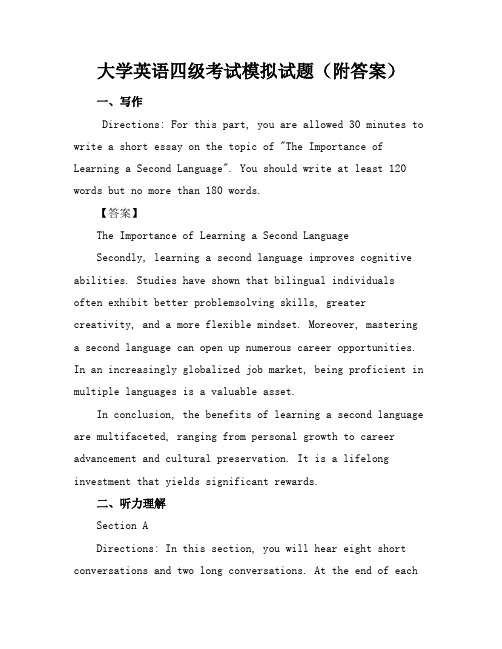
大学英语四级考试模拟试题(附答案)一、写作Directions: For this part, you are allowed 30 minutes to write a short essay on the topic of "The Importance of Learning a Second Language". You should write at least 120 words but no more than 180 words.【答案】The Importance of Learning a Second LanguageSecondly, learning a second language improves cognitive abilities. Studies have shown that bilingual individuals often exhibit better problemsolving skills, greater creativity, and a more flexible mindset. Moreover, mastering a second language can open up numerous career opportunities. In an increasingly globalized job market, being proficient in multiple languages is a valuable asset.In conclusion, the benefits of learning a second language are multifaceted, ranging from personal growth to career advancement and cultural preservation. It is a lifelong investment that yields significant rewards.二、听力理解Section ADirections: In this section, you will hear eight short conversations and two long conversations. At the end of eachconversation, one or more questions will be asked about what was said. Both the conversation and the questions will be spoken only once. After each question, there will be a pause. During the pause, you must read the four choices marked A), B), C), and D), and decide which is the best answer. Then mark the corresponding letter on the Answer Sheet with a single line through the centre.1. A) The woman doesn't want to cook dinner.B) The man will cook dinner for the woman.C) They are going to eat out.D) They are discussing the menu for tomorrow.【答案】C)Section BDirections: In this section, you will hear two passages. At the end of each passage, you will hear three or four questions. Both the passage and the questions will be spoken only once. After you hear a question, you must choose the best answer from the four choices marked A), B), C), and D). Then mark the corresponding letter on the Answer Sheet with a single line through the centre.Passage One2. A) It is a way to express individuality.B) It is a sign of social status.C) It reflects cultural background.D) It is a form of artistic expression.【答案】A)三、阅读理解Section ADirections: In this section, there is a passage with ten blanks. You are required to select one word for each blankfrom a list of choices given in a word bank following the passage. Read the passage through carefully before makingyour choices. Each choice in the bank is identified a letter. Please mark the corresponding letter for each item on the Answer Sheet with a single line through the centre. You maynot use any of the words in the bank more than once.Passage【答案】26. D) substantial27. A) outweigh28. C) enhance四、翻译Directions: For this part, you are allowed 30 minutes to translate a passage from Chinese into English. You shouldwrite your answer on the Answer Sheet.中国传统文化中,龙是吉祥的象征,代表着权力、威严和好运。
全国英语等级考试四级(pet-4)模拟听力试题
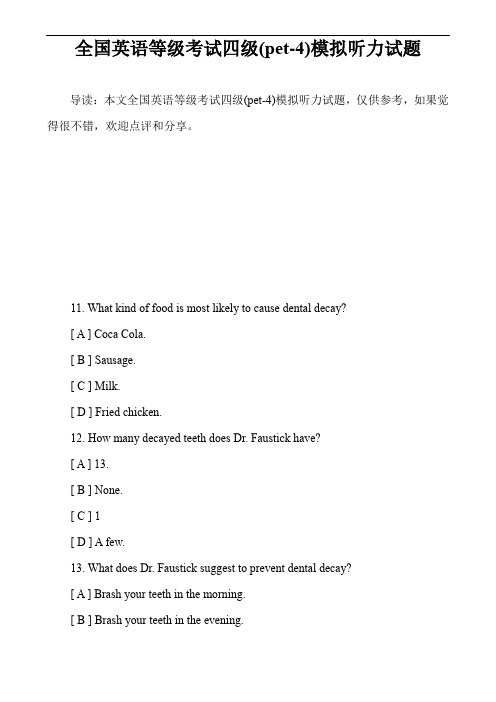
全国英语等级考试四级(pet-4)模拟听力试题导读:本文全国英语等级考试四级(pet-4)模拟听力试题,仅供参考,如果觉得很不错,欢迎点评和分享。
11. What kind of food is most likely to cause dental decay?[ A ] Coca Cola.[ B ] Sausage.[ C ] Milk.[ D ] Fried chicken.12. How many decayed teeth does Dr. Faustick have?[ A ] 13.[ B ] None.[ C ] 1[ D ] A few.13. What does Dr. Faustick suggest to prevent dental decay?[ A ] Brash your teeth in the morning.[ B ] Brash your teeth in the evening.[ C ] Clean your teeth shortly after eating.[ D ] Have your teeth X-rayed.14. Marco Polo came to China[ A ] alone.[ B ] with two friends.[ C ] with his brothers.[ D ] with his father and uncle.15. He stayed in China for almost[ A ] 20 years.[ B ] 12 years.[ C ] 7 years.[ D ] 3 years.16. How many unbelievable descriptions in Marco Polo’s book are mentioned in the passage?[ A ] 5.[ B ] 3.[ C ] 2.[ D ] 1.17. What is Einstein’s greatest contribution to human beings?[ A ] His teaching.[ B ] His theory of relativity.[ C ] His theory on advanced mathematics.[ D ] His research.18. When did Einstein’s family move to Munich?[ A ] When he was 2 years old.[ B ] When he was 14 years old.[ C ] When he finished his study.[ D ] When he became a teacher.19. When did Einstein begin teaching?[ A ] In 1901.[ B ] In 1902.[ C ] In 1910.[ D ] In 1879.20. How did Einstein explain Relativity to young students? [ A ] Patiently.[ B ] Intelligently.[ C ] Indifferently.[ D ] Vividly.。
大学英语四级改革适用(听力)模拟试卷11(题后含答案及解析)

大学英语四级改革适用(听力)模拟试卷11(题后含答案及解析)题型有:1. How does the woman cope with the tutoring and her own studying?12. What does the woman think of her teaching?9.A.She will take some lessons.B.She will travel in the downtown.C.She will attend the party.D.She will do the teaching job.正确答案:D解析:选项均以“She will+原形动词”开头表明,本题考查女士将来的行为动作。
由女士提到的I godowntown to tutor a few students at high school可知,女士将要去教书,故答案为D)。
知识模块:听力10.A.They cannot find a good math teacher.B.They cannot pass the examination.C.They cannot catch up with the lessons.D.They cannot meet the requirements.正确答案:C解析:选项中的They cannot pass the examination/meet the requirements表明,本题可能与They遇到的问题有关。
由女士提到的The problem is…kids are far behind when they get to juniour high school可知,孩子跟不上课,故答案为C)。
知识模块:听力11.A.She asks for a leave from her professor.B.She finishes her examinations first.C.She only gives the lessons on weekend.D.She affords more time to the tutoring.正确答案:C解析:选项中中的finishes her examinations first和only gives the lessons on weekend表明,本题可能考查女士如何安排自己的学习和教书。
英语四级听力新题型模拟2021(第11套) 短篇新闻(2)
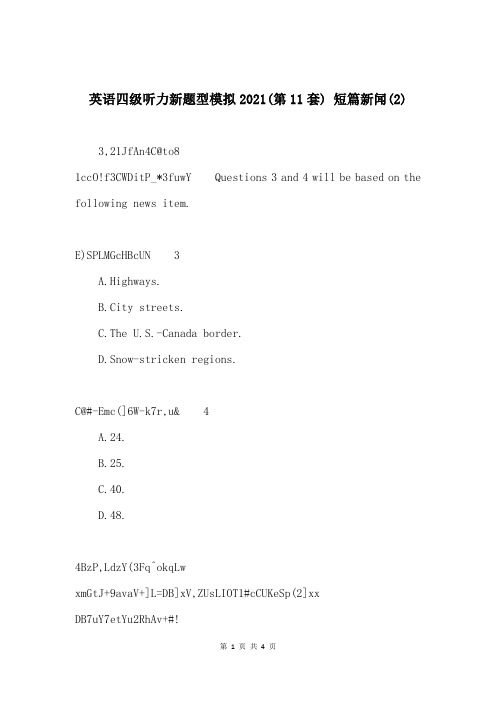
英语四级听力新题型模拟2021(第11套) 短篇新闻(2)3,21JfAn4C@to81ccO!f3CWDitP_*3fuwY Questions 3 and 4 will be based on the following news item.E)SPLMGcHBcUN 3A.Highways.B.City streets.C.The U.S.-Canada border.D.Snow-stricken regions.C@#-Emc(]6W-k7r,u& 4A.24.B.25.C.40.D.48.4BzP,LdzY(3Fq^okqLwxmGtJ+9avaV+]L=DB]xV,ZUsLIOT1#cCUKeSp(2]xxDB7uY7etYu2RhAv+#!m|V-7!X9,AK News Item Two05|TO|]emtTY.Canadian police and military teams were working Tuesday afternoon to rescue about 300 people stranded after what a local official termed "the most brutal storm to hit the Ontario region in 25 years". Some people have been stuck in their vehicles for more than 24 hours following blinding snow that piled up so high it made it almost impossible to open vehicle doors. Ontario Provincial police initially reported about 360 vehicles and about 300 people have been stranded near Sonia, Ontario, on Highway 402, a major thoroughfare linking the U.S.-Canada border to London, Ontario. Some of those people have since been rescued but Sonia mayor, Mike Bradley, said it could be another 24 hours before everyone is taken to safety.,BmtLJqmEw4hF3S6q!am 3.What did the rescue efforts mainly concentrate on?4.How long might the last group of people have been trapped in their vehicles before being rescued?Zis-FWNjWJhd&L 短篇新闻(二)w]2[o58#8Z(xH,T,X] 一场被安大略当局称为“25年来最为凶残的暴风雪”过后,加拿大警方和军队在周二下午正对被困的300位市民进行着救援工作.@1*t_%XzYfO45%bNxsQ。
英语CET4听力模拟试题
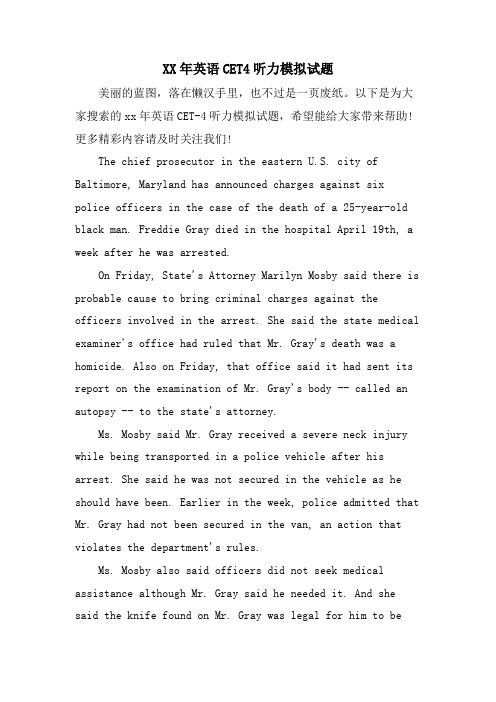
XX年英语CET4听力模拟试题美丽的蓝图,落在懒汉手里,也不过是一页废纸。
以下是为大家搜索的xx年英语CET-4听力模拟试题,希望能给大家带来帮助!更多精彩内容请及时关注我们!The chief prosecutor in the eastern U.S. city of Baltimore, Maryland has announced charges against sixpolice officers in the case of the death of a 25-year-old black man. Freddie Gray died in the hospital April 19th, a week after he was arrested.On Friday, State's Attorney Marilyn Mosby said there is probable cause to bring criminal charges against the officers involved in the arrest. She said the state medical examiner's office had ruled that Mr. Gray's death was a homicide. Also on Friday, that office said it had sent its report on the examination of Mr. Gray's body -- called an autopsy -- to the state's attorney.Ms. Mosby said Mr. Gray received a severe neck injury while being transported in a police vehicle after his arrest. She said he was not secured in the vehicle as he should have been. Earlier in the week, police admitted that Mr. Gray had not been secured in the van, an action that violates the department's rules.Ms. Mosby also said officers did not seek medical assistance although Mr. Gray said he needed it. And she said the knife found on Mr. Gray was legal for him to becarrying. The Baltimore Sun newspaper reports she told Mr. Gray's family that "no one is above the law." It also said Ms. Mosby believes Mr. Gray was "improperly arrested" because police had no legal reason to detain him.Charges against the officers include involuntary manslaughter, assault, misconduct and false imprisonment. The driver of the police vehicle faces second-degree murder and five other charges.Police gave their report on the case to the state's attorney's office on Thursday. That was one day earlier than the time limit police had set. The findings of the internal investigation have not been made public.Officials, citizen groups and others continue to work to restore calm to the city. For now, people are not permitted to be outside from 10 o'clock at night to fiveo'clock in the morning. Officials say this curfew will likely last a few more days. The streets have been mostly empty during the curfew, and the city has been mostly calm since the riots on Monday.Thousands of members of the Maryland National Guard, and police from Baltimore, the state of Maryland and other areas are patrolling the streets during the day and at night.The case of Freddie Gray in Baltimore has influenced demonstrations in other parts of the country, includingBoston, Cincinnati, New York, Washington and Philadelphia. Activists demonstrating in support of labor and immigrant rights on May 1 have added tensions with police to their message.Calls for returning order to BaltimoreMany people have condemned the actions of those who rioted on Monday. But they say that in addition toreturning order to the city, officials must deal with the reasons people are angry with police.Gerald Miller lives in Baltimore."Baltimore will recover. I think we will recover. Sure, sure, but it's gonna to take, you know, people getting involved, getting in the trenches not just in behind, you know a lectern, or when the camera's on, or whatever, you gotta get down here in it with the people. This is where the people are. This is where they're hurtin'."Cynthia Green also lives in the city."My heart is heavy for the, the people of Baltimore,for this munity, and all the other munities. And I'm sadfor the young people that got up caught up in all of this."Stephanie Rawlings-Blake is the mayor of Baltimore. She spoke to residents on Tuesday, after the rioting."We saw people ing together to reclaim our city, to clean our city and to help heal our city. I think this canbe our defining moment and not the darkest days that we saw yesterday."People had gathered peacefully for days demanding to know why Mr. Gray died. The violence began after thefuneral for Mr. Gray on Monday. Police say members of criminal groups joined the protestors. They say they did not expect that would happen.Officer Eric Kowalczyk is a spokesman for the Baltimore police. On Tuesday, he told reporters that police were expecting most of those who would gather after the funeral would be students."When we deployed our officers yesterday, we were deploying for a high school event. I don't think that there is anyone in the country that would expect us to deploy automatic weapons and armored vehicles to an event with 13, 14- and 15-year-olds."After the violence on Monday, Maryland Governor Larry Hogan declared a state of emergency. He moved his office and his top aides to the city.After the rioting, President Barack Obama said police cannot solve the problems in Baltimore by themselves."We can't just leave it to the police. I think there are police departments that have to do some soul searching.I think there are some munities that have to do some soulsearching. But I think we as a country have to do some soul searching."The president said rioting is not the same as protesting. And he said those who caused destruction must be punished.Later the president said it is important that the truth es out about what happened to Mr. Gray. He also noted that the individuals who are charged should receive fair treatment. Mr. Obama said the Justice Department and new U.S. Attorney General Loretta Lynch are municating with Baltimore officials to offer help if needed.Many of the protesters say they are angry about what they believe is continuing poor treatment of blacks by the police and what they say is the unwillingness of city officials to do anything about it. And they say there is little economic power in black neighborhoods. They say that has been a problem for many years.。
最新英语周报》大学版四级模拟试题与四级真题
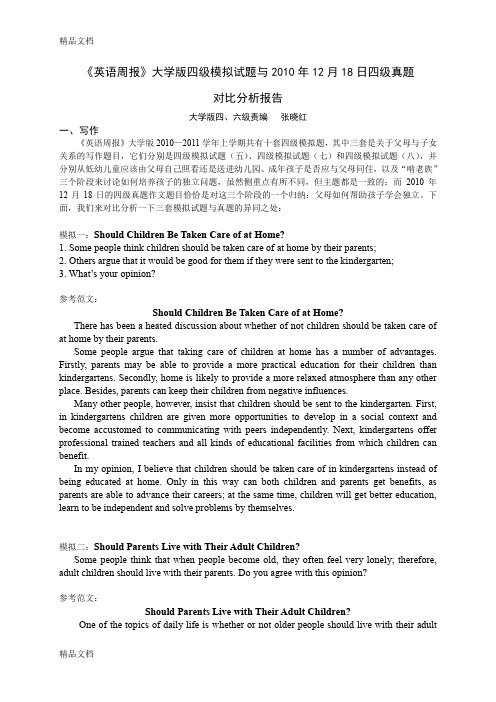
《英语周报》大学版四级模拟试题与2010年12月18日四级真题对比分析报告大学版四、六级责编张晓红一、写作《英语周报》大学版2010—2011学年上学期共有十套四级模拟题,其中三套是关于父母与子女关系的写作题目,它们分别是四级模拟试题(五)、四级模拟试题(七)和四级模拟试题(八),并分别从低幼儿童应该由父母自己照看还是送进幼儿园、成年孩子是否应与父母同住,以及“啃老族”三个阶段来讨论如何培养孩子的独立问题,虽然侧重点有所不同,但主题都是一致的;而2010年12月18日的四级真题作文题目恰恰是对这三个阶段的一个归纳:父母如何帮助孩子学会独立。
下面,我们来对比分析一下三套模拟试题与真题的异同之处:模拟一:Should Children Be Taken Care of at Home?1. Some people think children should be taken care of at home by their parents;2. Others argue that it would be good for them if they were sent to the kindergarten;3. What’s your opinion?参考范文:Should Children Be Taken Care of at Home?There has been a heated discussion about whether of not children should be taken care of at home by their parents.Some people argue that taking care of children at home has a number of advantages. Firstly, parents may be able to provide a more practical education for their children than kindergartens. Secondly, home is likely to provide a more relaxed atmosphere than any other place. Besides, parents can keep their children from negative influences.Many other people, however, insist that children should be sent to the kindergarten. First, in kindergartens children are given more opportunities to develop in a social context and become accustomed to communicating with peers independently. Next, kindergartens offer professional trained teachers and all kinds of educational facilities from which children can benefit.In my opinion, I believe that children should be taken care of in kindergartens instead of being educated at home. Only in this way can both children and parents get benefits, as parents are able to advance their careers; at the same time, children will get better education, learn to be independent and solve problems by themselves.模拟二:Should Parents Live with Their Adult Children?Some people think that when people become old, they often feel very lonely; therefore, adult children should live with their parents. Do you agree with this opinion?参考范文:Should Parents Live with Their Adult Children?One of the topics of daily life is whether or not older people should live with their adultchildren. My answer for this question is that it is better for them not to do so.Firstly, people of different ages have different ways of living. Many old people like a quiet, peaceful and regular life whereas the young prefer noisy and unrestrained enjoyment. Secondly, people of different generations have different views and values. When they live together, they may disagree with each other on matters ranging from minor domestic matters to national and international issues. Consequently, family life may be unpleasant or even unbearable to both the old and the young. Last but not least, adult children, like their parents, love independence and freedom, but their parents still take them as children and unintentionally interfere in their affairs. The situation could be worse if the children are already married. For old people’s interference, many couples may have conflicts every day, even leading to a divorce.From what has been discussed above, we may safely draw the conclusion that if the parents and their adult children do not live together, both the old and the young enjoy complete independence and freedom, lead a life they like and keep their affections for each other.模拟三:NEET Group Phenomenon1. 社会上出现“啃老族”:已经成年、有劳动能力的年轻人,仍依靠父母供养。
英语四级的听力模拟试题
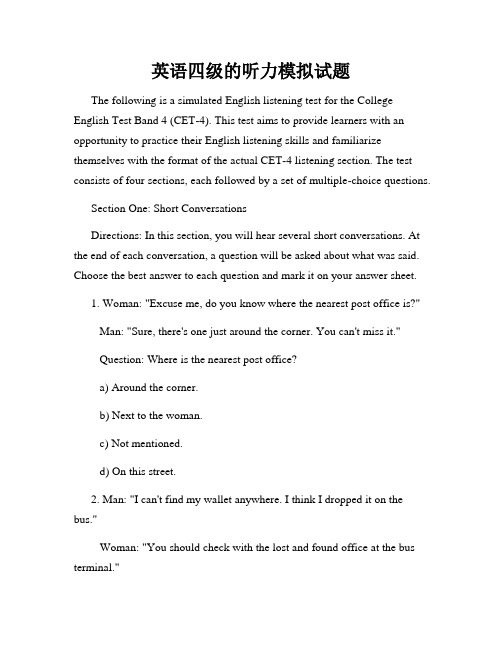
英语四级的听力模拟试题The following is a simulated English listening test for the College English Test Band 4 (CET-4). This test aims to provide learners with an opportunity to practice their English listening skills and familiarize themselves with the format of the actual CET-4 listening section. The test consists of four sections, each followed by a set of multiple-choice questions.Section One: Short ConversationsDirections: In this section, you will hear several short conversations. At the end of each conversation, a question will be asked about what was said. Choose the best answer to each question and mark it on your answer sheet.1. Woman: "Excuse me, do you know where the nearest post office is?"Man: "Sure, there's one just around the corner. You can't miss it."Question: Where is the nearest post office?a) Around the corner.b) Next to the woman.c) Not mentioned.d) On this street.2. Man: "I can't find my wallet anywhere. I think I dropped it on the bus."Woman: "You should check with the lost and found office at the bus terminal."Question: Where does the man need to go?a) The bus terminal.b) The police station.c) The lost and found office.d) Not mentioned.Section Two: Long ConversationsDirections: In this section, you will hear two long conversations. At the end of each conversation, several questions will be asked about what was said. Choose the best answer to each question and mark it on your answer sheet.Conversation One:Man: "Hello, I'm calling about the advertisement for the part-time job."Woman: "Yes, how can I help you?"Man: "I am interested in the position. Could you tell me more about it?"Woman: "Of course. It's a customer service job at a local bookstore. You'll be helping customers find books, taking payments, and organizing shelves. The working hours are flexible, mostly evenings and weekends. Are you available during those times?"Man: "Yes, I am. What's the pay?"Woman: "The starting pay is $10 per hour, but it can increase based on performance and experience."Man: "Great! Where can I submit my application?"Question 1: What is the job position the man is interested in?a) A librarian.b) A bookstore assistant.c) A customer service representative.d) Not mentioned.Question 2: What are the working hours for this job?a) Mornings and afternoons.b) During weekdays only.c) Mostly evenings and weekends.d) Not mentioned.Conversation Two:Woman: "Hey, I heard you got accepted into your dream university. Congratulations!"Man: "Thanks! I'm really excited about it."Woman: "When do classes start?"Man: "In September, but I have a lot of preparations to make before then."Woman: "Are you going to move to the city where the university is located?"Man: "Yes, I'm planning to find an apartment near the campus."Woman: "That's a good idea. It will save you commuting time."Man: "Exactly. I want to focus on my studies and get involved in campus activities."Woman: "I'm sure you'll do great. Enjoy your time at university!"Question 3: When do classes start for the man?a) In August.b) In September.c) In October.d) Not mentioned.Question 4: Why does the man want to find an apartment near the campus?a) To save commuting time.b) To be closer to his friends.c) To attend campus activities.d) Not mentioned.Section Three: PassagesDirections: In this section, you will hear several passages. After each passage, you will be asked several questions about the passage. Choose the best answer to each question and mark it on your answer sheet.Passage One:Attention all passengers, this is a reminder that smoking is strictly prohibited in all areas of the train. Passengers are also reminded to keep their tickets with them at all times as they may be required for inspection. Food and drinks are allowed on board, but please dispose of any waste in the designated trash bins located throughout the train. We hope you have a pleasant journey.Question 1: What is prohibited on the train?a) Mobile phones.b) Food and drinks.c) Smoking.d) Carrying luggage.Question 2: What should passengers do with their tickets?a) Keep them at home.b) Show them to other passengers.c) Keep them with them at all times.d) Not mentioned.Passage Two:Welcome to the National Museum of History. This museum offers a unique opportunity to explore the rich history and culture of our country. Visitors can enjoy a variety of exhibits, including ancient artifacts,traditional artwork, and interactive displays. Please remember to keep your voices down and refrain from touching the exhibits. Guided tours are available daily at 10 am and 2 pm. We hope you have a memorable experience.Question 3: What can visitors enjoy at the National Museum of History?a) A variety of exhibits.b) Interactive displays only.c) Guided tours.d) Not mentioned.Question 4: What should visitors avoid doing in the museum?a) Speaking quietly.b) Touching the exhibits.c) Taking photographs.d) Not mentioned.Section Four: TalksDirections: In this section, you will hear several short talks. After each talk, you will be asked several questions about the talk. Choose the best answer to each question and mark it on your answer sheet.Talk One:Good morning, everyone. Today, I will be talking about global warming and its effects on the environment. Global warming is caused by the increaseof greenhouse gases in the atmosphere, mainly due to human activities such as burning fossil fuels and deforestation. The consequences of global warming include rising temperatures, melting ice caps, and extreme weather events. It is essential for us to take immediate action to reduce greenhouse gas emissions and protect our planet for future generations. Thank you.Question 1: What is the main cause of global warming?a) Melting ice caps.b) Rising temperatures.c) Burning fossil fuels and deforestation.d) Not mentioned.Question 2: What are the consequences of global warming mentioned in the talk?a) Extinction of species.b) Increase of greenhouse gases.c) Rising sea levels.d) Not mentioned.Talk Two:Today, I will be talking about the benefits of regular exercise. Regular exercise has numerous advantages for both physical and mental health. It improves cardiovascular fitness, increases muscle strength, and helps maintain a healthy weight. Exercise is also beneficial for mental well-being as it reduces stress, boosts mood, and improves sleep quality. Furthermore,engaging in physical activity can enhance cognitive function and reduce the risk of various chronic diseases. Remember, staying active is key to a healthy lifestyle.Question 3: What are the benefits of regular exercise mentioned in the talk?a) Increased risk of chronic diseases.b) Reduced stress and improved cognitive function.c) Maintaining an unhealthy weight.d) Not mentioned.Question 4: How does regular exercise affect mental well-being?a) It causes stress and insomnia.b) It reduces stress and improves mood.c) It increases the risk of chronic diseases.d) Not mentioned.This concludes the English listening test. Please check your answers and calculate your score accordingly. Thank you for participating and good luck with your English studies.。
最新 英语周报大学英语四级全真模拟题听力自测(音频)-精品
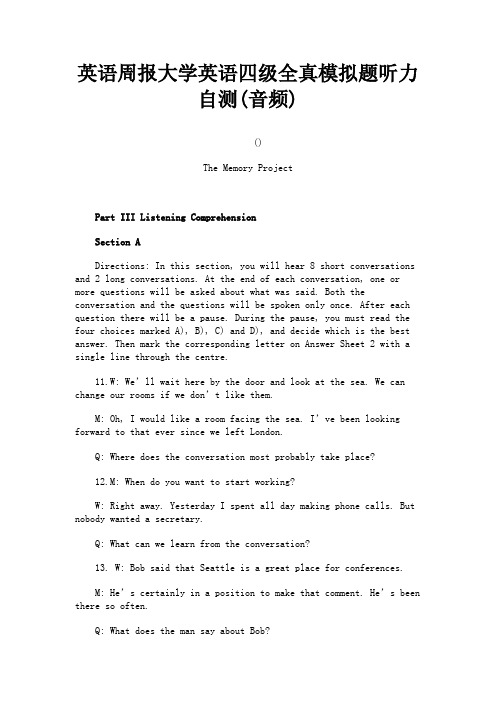
英语周报大学英语四级全真模拟题听力自测(音频)()The Memory ProjectPart III Listening ComprehensionSection ADirections: In this section, you will hear 8 short conversations and 2 long conversations. At the end of each conversation, one or more questions will be asked about what was said. Both the conversation and the questions will be spoken only once. After each question there will be a pause. During the pause, you must read the four choices marked A), B), C) and D), and decide which is the best answer. Then mark the corresponding letter on Answer Sheet 2 with a single line through the centre.11.W: We’ll wait here by the door and look at the sea. We can change our rooms if we don’t like them.M: Oh, I would like a room facing the sea. I’ve been looking forward to that ever since we left London.Q: Where does the conversation most probably take place?12.M: When do you want to start working?W: Right away. Yesterday I spent all day making phone calls. But nobody wanted a secretary.Q: What can we learn from the conversation?13. W: Bob said that Seattle is a great place for conferences.M: He’s certainly in a position to make that comment. He’s been there so often.Q: What does the man say about Bob?。
- 1、下载文档前请自行甄别文档内容的完整性,平台不提供额外的编辑、内容补充、找答案等附加服务。
- 2、"仅部分预览"的文档,不可在线预览部分如存在完整性等问题,可反馈申请退款(可完整预览的文档不适用该条件!)。
- 3、如文档侵犯您的权益,请联系客服反馈,我们会尽快为您处理(人工客服工作时间:9:00-18:30)。
《英语周报》英语四级考试听力模拟试题(十一)English Weekly CET-4 Listening Practice Test ⅪPart III Listening ComprehensionSection ADirections: In this section, you will hear 8 short conversations and 2 long conversations. At the end of each conversation, one or more questions will be asked about what was said. Both the conversation and the questions will be spoken only once. After each question there will be a pause. During the pause, you must read the four choices marked A), B), C) and D), and decide which is the best answer. Then mark the corresponding letter on Answer Sheet 2 with a single line through the centre.11.W: We’ll wait here by the door and look at the sea. We can change our rooms if we don’t like them.M: Oh, I would like a room facing the sea. I’ve been looking forward to that ever since we left London.Q: Where does the conversation most probably takeplace?12.M: We’ll be here in London sitting in a newspaper office or teaching in a classroom full of chalk dust.W: Well, George, you’ll be able to go out in the sunshine sometimes. You are a journalist. I’m the one who has to stay in the classroom. Don’t forget.Q: What is the woman’s profession?13.W: Do you think you could give me a ride to the library tonight?M: I’d like to, but I’m heading in the other direction. I’m meeting Jean tonight...Q: What does the man mean?14.M: When do you want to start working?W: Right away. Yesterday I spent all day long making phone calls. But nobody wanted a secretary.Q: What can we learn from the conversation?15.W: What’s the matter with your appetite?M: I’m not used to eating in the middle of the night.Q: What does the man mean?16.M: You know I’ve been watering my plants regularly. But they are still not doing well in my new apartment.W: Maybe instead of keeping them in the corner, youshould put them directly in front of the window.Q: What does the woman imply?17.W: Bob, shall I cut your hair for you?M: You must be kidding. Last time you almost made me bald.Q: What does the man imply?18.M: This scarf is nice, but Debbie really wanted a sweater for her birthday.W: I know. But I didn’t know her size. So I got this as an alternative.Q: What can be inferred from this conversation?Now you will have two long conversations.Conversation OneM: Excuse me, are you waiting to buy concert tickets?W: Yes, I am. So are all these people in front of me.M: Have you been here long?W: About 45 minutes. I’ve moved forward a total of about 3 feet in that time.M: You’re kidding!W: Not at all. There was a couple up ahead of me who got so disgusted they finally gave up and left. They said they’d been waiting for more than an hour.M: Does anyone know what’s causing the delay?W: If so, no one is letting us know. It could be that there aren’t enough people selling tickets this afternoon. Or maybe their computer’s down. I’m sure the concert hasn’t been canceled.M: I just hope they don’t run out of tickets before I get there.W: That really would be annoying, wouldn’t it?M: I guess I should have come before lunch. Or has it been like this all day?W: Apparently it has. In fact, before I came, I tried calling to charge my tickets over the phone, just to avoid this long wait, but they’re not taking phone orders, or checks, or credit cards. It’s cash or nothing. And you have to come in person.M: Well, there’re two more hours before the ticket office closes. Tickets to a good concert are worth waiting for. So I think I’ll just make myself comfortable.Questions 19 to 21 are based on the conversation you have just heard.19.What are the two speakers doing?20.Why did the couple ahead of the woman give upwaiting?21.At what time of the day does the conversation most probably take place?Conversation TwoW: Ok, last night you were supposed to read an article about human bones. Are there any comments about it?M: Well, to begin with, I was surprised to find out there was so much going on in bones. I always assumed they were pretty lifeless.W: Well, that’s an assumption many people make. But the fact is that bones are made of dynamic living tissue that requires continuous maintenance and repair.M: Right. That’s one of the things I found so fascinating about the article---the way the bones repair themselves.W: Ok. So can you tell us how the bones repair themselves?M: Sure. See, there are two groups of different types of specialized cells in the bone that work together to do it. The first group goes to an area of the bone that needs repair. This group of cells produces the chemical that actually breaks down the bone tissue, and leaves a hole in it. After that the secondgroup of specialized cells comes and produces the new tissue that fills in the hole that was made by the first group.W: Very good. This is a very complex process. In fact, scientists who study human bones don’t completely understand it yet. They are still trying to find out how it all actually works. Specifically, because sometimes after the first group of cells leaves a hole in the bone tissue, for some reason, the second group doesn’t completely fill in the hole. And this can cause real problems. It can actually lead to a disease in which the bone becomes weak and is easily broken.M: Ok, I get it. So if the scientists can figure out what makes the specialized cells work, maybe they can find a way to make sure the second group of cells completely fills the hole in the bone tissue every time. That’ll prevent the disease from ever occurring.Questions 22 to 25 are based on the conversation you have just heard.22. What is the conversation mainly about?23. What is the function of the first group of specialized cells discussed in the conversation?24. What does the woman say about scientists who study the specialized cells in human bones?25. According to the man, what is one important purpose of studying specialized cells in human bones?Section BDirections: In this section, you will hear 3 short passages. At the end of each passage, you will hear some questions. Both the passage and the questions will be spoken only once. After you hear a question, you must choose the best answer from the four choices marked A), B), C) and D). Then mark the corresponding letter on Answer Sheet 2 with a single line through the centre.Passage OneI had spent my last day in London visiting friends, taking pictures, and doing some last-minute shopping. Among other things, I had bought some presents: a shirt for my brother, a wool blanket for my sister, and a battery-powered alarm clock for my father.After traveling in a crowded bus and waiting in the noisy airport building, I was glad to be sitting in the plane at last. In a few minutes, we would be asked to fasten our seat belts and to stop smoking, and then we would soon be up in the sky on our flight to Berlin.But I had been mistaken. Ten minutes later, instead ofenjoying the beauty of the evening sky from high above the clouds, I was sitting in a smoke-filled room with an airline official and a police officer at my side. On the table in front of me was one of my suitcases.The officials were very polite. They asked me to show them my passport, my ticket, and my baggage check. Then I was requested to open the suitcase and to spread out its contents on the table.I did as I was told. The moment I placed the alarm clock on the table, the two officials looked at each other and smiled. Hearing the clock ticking away merrily, I suddenly understood. Someone must have heard the ticking noise coming from my suitcase and thought there was a time bomb hidden in it.Questions 26 to 28 are based on the passage you have just heard.26.How did the man spend his last day in London?27.What present did he buy for his father?28.Why did the man get off the plane ten minutes later?Passage TwoHow many of you drink cola? Nearly everyone. Did youknow that cola started out not as a soft drink but as a cure for headaches back in the late 1800s? John S. Pemberton, a druggist from Atlanta, had experimented for many months trying to find a cure for the common headache. He worked in his backyard, mixing and heating different combinations of oils and flavors until he found one that seemed promising. Pemberton bottled the mixture and began selling it in drugstores as concentrated syrup that the customer had to mix with water before drinking.Cola’s transformation from medicinal syrup to a carbonated soft drink came about quite by accident. One day, a customer came into a drugstore complaining of a headache and asked for a bottle of cola syrup. He wanted to take it right away. So he asked the clerk to mix the medicine while he waited. The clerk, instead of walking to the other end of the counter to get plain water, suggested mixing the syrup with soda water. The customer agreed, and after drinking it, remarked how good it tasted. The clerk continued offering the mix and carbonated cola grew in popularity. Today carbonated cola is sold in most countries around the world. And although they no longer contain the ingredients used to cure headaches, they are still very refreshing.Questions 29 to 31 are based on the passage you have just heard.29.What is the passage mainly about?30.How was cola sold originally?31.How was cola syrup made into a soft drink?Passage ThreeOne of the most popular myths about the United States in the 19th century was that of the free and simple life of the farmer. It was said that farmers worked hard on their own land to produce whatever their families needed. They might sometimes trade with their neighbors, but in general they could get along just fine by relying on themselves, not on commercial ties with others. This is how Thomas Jefferson idealized the farmer at the beginning of the 19th century. And at that time, this may have been close to the truth, especially on the frontier.But by the mid-century, sweeping changes in agriculture were well underway as farmers began to specialize in the raising of crops such as cotton, corn or wheat. By late in the century, revolutionary advances in farm machinery had vastly increased production of specialized crops and an extensive network of railroads had linked farmers throughoutthe country to markets in the east and even overseas. By raising and selling specialized crops, farmers could afford more and finer goods and achieve a much higher standard of living---but at a price.Now farmers were no longer dependent just on the weather and on their own efforts. Their lives were increasingly controlled by banks, which had power to grant or deny loans for new machinery, and by the railroads which set the rates for shipping their crops to market. As businessmen, farmers now had to worry about national economic depressions and the influence of world supply and demand on, for example, the price of wheat in Kansas. And so by the end of the 19th century, the era of Jefferson’s independent farmer had come to a close.Questions 32 to 35 are based on the passage you have just heard.32. What is the main topic of the passage?33. According to the passage, what was the major change in agriculture during the 19th century?34. What was one result of the increased use of machinery on farms in the United States?35. According to the passage, why was the world market important for United States agriculture?Section CDirections: In this section, you will hear a passage three times. When the passage is read for the first time, you should listen carefully for its general idea. When the passage is read for the second time, you are required to fill in the blanks numbered from 36 to 43 with the exact words you have just heard. For blanks numbered from 44 to 46 you are required to fill in the missing information. For these blanks, you can either use the exact words you have just heard or write down the main points in your own words. Finally, when the passage is read for the third time, you should check what you have written.Psychologists have found that only about two percent of adults use their creativity, compared with ten percent of seven-year-old children. When five-year olds were tested, the results rose to ninety percent! (36)Curiosity and originality are daily occurrences for the small child, but somehow most of us lose the (37) freedom and flexibility of the child as we grow older. The need to “follow directions”and “do it right”plus the many social (38) constraints we put on ourselves (39) prevent us from using our creative potential.It is never too late to tap our creative potential. Someof us, however, find it difficult to think in (40) imaginative and flexible ways because of our set (41) pattern of approaching problems. When we are inflexible in our approach to situations, we close our minds to creative (42) possibilities.Being creative doesn’t necessarily mean being a (43) genius. (44)It means looking at situations in a new way or putting something together in a new form that makes sense. Spontaneity is one of the key elements of creativity.If you were to ask someone, “What’s half of eight?”and received the answer “zero”, you might laugh and say “That’s wrong!”(45)But the figure 8 can be visualized as two zeros, one on top of the other, or it can also be seen as two 3s standing face to face.The ability to visualize our environment in new ways opens our perspective and allows us to make all kinds of discoveries. (46)If each of us asked the question “why”more often and investigated “other”alternatives to problem solving, our lives would be more interesting and exciting.【《。
